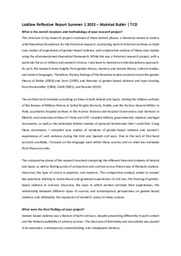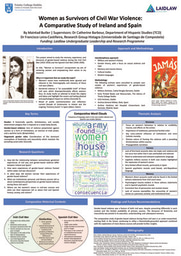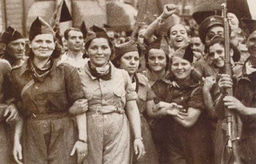Finding Women's Voices: Reflections on Global Citizenship

The Laidlaw Scholarship experience in general has enabled me to grow as a leader and global citizen, with a focus on finding and building connections between the experiences of women across time and across global boundaries. I have learned the value of truly listening to and hearing the perspectives of others, not only during my LiA but also in my historical research. It is easy to veer from talking on behalf of someone to talking over them, but it is a skill that we all must learn and one which we must continuously practice in order to create real change.
My LiA with Women Rights Initiative (WORI) represents to me the encapsulation of my development over the course of the Laidlaw process, exemplifying the synthesis and practical implementation of the academic, leadership, and interpersonal skills I had been cultivating. While I had had plenty of discussions with fellow Laidlaw scholars and my Laidlaw coordinator over the course of the 18-month process about navigating cultural differences and what it’s like to work in a new and different environment, I could only truly fathom it when I was on the ground, in the community. My stay in Uganda marked the first time that I had ever been to such a foreign environment, one in which I was clearly an outsider, and indeed it was my first time in the Global South. This was an important learning experience for me, reinforcing my desire to listen to and learn from the lived experiences of those with whom I was working and to engage in a continuous process of unlearning the prejudices and preconceptions I had come with in order to best respond to the needs of the community through the work of my LiA.
I have found that there is more that unites us than divides us, particularly when we are working towards common goals, such as ending gender-based violence (GBV) and empowering marginalised women. On the face of it, although my colleagues and I may have come from entirely different worlds and backgrounds, we were united by our passion and love for women and our drive to ensure that all women, whether they be in our local community or further afield, have access to the support they need to reach their potential and live fulfilling lives free from violence. I believe that we cannot leave anyone behind in our ongoing search for equality and equity. On a more interpersonal basis, I was very fortunate to have had such welcoming and friendly colleagues and to have been able to have had such engaging and interesting conversations with them, learning about Ugandan culture from them, and discovering along the way that Ugandans are just as much “craic” as Irish people are!
Upon reflection, my Laidlaw Scholarship experience as a whole has been an exercise in developing as a global citizen, although it may not have been apparent to me at the beginning. The very nature of the scholarship, and the way in which I have approached it, has challenged me to put myself in the shoes of others and to question what it really means to make a difference and how best I can centre those whom I am trying to empower in my work. Indeed, the overall theme of my Laidlaw Scholarship experience has been empowering and centring marginalised women across national boundaries, whose voices and trauma have traditionally gone unheard. By combining historical research with practical work on the ground, I have had to question what it means to come from the privilege that I do and how I can best use the opportunities afforded to me to bring marginalised, vulnerable groups along with me, leaving no-one behind and no-one unheard.
When titling my Summer 1 blog post, I posed the question “Where are women’s voices?”. However, it is safe to say that over the course of my Laidlaw Scholarship I have found an incredibly diverse set of female voices and have strived to empower and centre these women in all that I have done. I will carry this drive with me as I continue in the field of gender studies, gender-based violence, and women’s rights in my academic and professional pursuits. I know that listening and truly hearing people who are different from me is the first step towards making a difference: I want to take the next one.





Please sign in
If you are a registered user on Laidlaw Scholars Network, please sign in